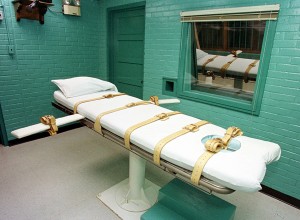According to the 2014 Texas Democratic Party platform:
“In order to promote public confidence and fairness in the Texas Criminal Justice system, Texas Democrats call for the passage of legislation that would abolish the death penalty in Texas and replace it with the punishment of life in prison without parole.”
Democrats Against the Death Penalty held a caucus meeting at the TDP State Convention that was attended by more than 150 people. Scott Cobb moderated the meeting. Speakers included Jeanette Popp, whose daughter was murdered in Austin in 1988. Two innocent people were wrongfully convicted of her daughter’s murder. They were in prison for 12 years before their exoneration. Jeanette met with the real killer in the Travis County Jail before his trial and told him that she did not want him to receive the death penalty.
The UT-Arlington newspaper The Shorthorn reported on the meeting of “Democrats Against the Death Penalty:
Speaker Jeanette Popp said she lost her daughter at the hands of a murderer. However, she said she does not support the death penalty because it is still taking the life of another human being.
She stated she will not stain her or her daughter’s hands with the murderer’s blood.
“Today, I want to ask you in memory of my daughter to stand together, united and strong,” Popp said. “Speak in one loud voice they can’t ignore. We will not tolerate being made accessories to murder.”
Democrats against the death penalty #ShorthornPol #txdems #dallas pic.twitter.com/GOJJhlmLEJ
— Kayla Stigall (@kayllila) June 27, 2014
Also speaking at the meeting was Delia Perez Meyer, whose brother is on Texas death row. Delia visits her brother every weekend. Her story is the subject of a new film, “The Road to Livingston”.












